- Home
- Terry Goodkind
Shroud of Eternity Page 14
Shroud of Eternity Read online
Page 14
The crowd roared, suddenly released from their sullen anxiety. Now their celebration was genuine glee.
Chief Handler Ivan crossed his massive arms over his vest made from the pelt of a sand panther. “At least it was a good show.”
Andre looked frustrated. “The champion has no modifications whatsoever. He is just a man and should not be able to defeat my creations.”
“That’ll keep you on your toes,” Maxim said with a smirk. “You just need to make better creations.”
Thora said, “Listen to the crowd. They are still cheering the champion. I expected them to grow tired of him by now.”
Elsa leaned forward. “They celebrate the skills of the champion, Sovrena, and they would not want to see him defeated by a monstrosity like that. You should make him fight better and better human combatants. The people will only accept another human champion.”
“For now, let him have his victory,” said Maxim, and then his lips quirked in a smile. “I’m sure Adessa will reward him quite well tonight. She has taken him as her lover already, has she not?”
Thora sniffed. “Of course. She takes each champion as her lover.”
Below in the arena, standing over the butchered body of the fleshmancer’s creation, the champion raised his bloody sword and turned in circles to receive the adulation of the crowd. When the cheers built to a crescendo, he reached up to grasp his helmet, pulling it off and flinging it free. He threw it far across the bloody sands so that he could smile and bask in the open air. He raised both hands in triumph.
* * *
Bannon watched the violent combat with trepidation. He had fought and killed many enemies since joining Nicci and Nathan, and he’d felt no remorse when he defended himself against the ferocious selka or the Lifedrinker’s dust people. But the very idea of bloody combat for sport displayed a cruelty that he could not understand.
He was sure his abusive father would have enjoyed the spectacle.
Bannon had hardened since leaving Chiriya Island. The darkest and ugliest days at home had nearly ruined him, but Bannon clung to and nurtured a spark of optimism and a sense of good in the world despite all the tragedies he had suffered. Now he squirmed uncomfortably at the sound of the cheers, the sight of the bloodshed. That horrific monster didn’t deserve to die any more than the distorted combat bear they had encountered … but such monstrosities should not have been created in the first place. They were unnatural and sickening.
He struggled with his feelings but did not understand them. When he watched the champion kill his opponent, though, Bannon acknowledged that it was a battle for survival. He supposed that people under extreme circumstances would do just about anything to stay alive. He himself certainly had.
The champion removed his helmet and stood exposed so the audience could see his face. As the victorious warrior turned his head up to stare at the crowd, Bannon froze. He knew that face. He recognized the eyes, the wide cheekbones, the rounded chin, even the grin.
He had seen that grin on a young boy’s face in times of joy, long ago in a childhood that had ended in violence and slavery.
Ian!
The champion was his friend Ian, stolen away by Norukai slavers so many years ago.
CHAPTER 19
Thaddeus, the new town leader of Renda Bay, was happy to receive the two young scholars from Cliffwall. “We will help you meet your needs,” he told Oliver and Peretta. “For the sorceress Nicci and the wizard Nathan, we’d do anything to show our gratitude. They saved our town.” His lips quirked in a smile. “Even the swordsman Bannon defeated more than his share of Norukai slavers. I think he has a genuine vendetta against them.”
Oliver nodded. “Yes, we watched all three of them fight many impossible enemies. They have many stories to tell.” He patted the pouch at his side in which he carried the reports Nicci and Nathan wished to have delivered up to D’Hara. “I wouldn’t believe them if I hadn’t seen myself what they could do.”
“Aye, we know some of what they endured,” Thaddeus said. “Join us for a town feast this evening, and we will share stories.”
“I can recite our tales accurately,” said Peretta, tossing her mop of tight dark ringlets. “I remember every detail.”
“She really does,” Oliver added, “and she won’t let you forget it.”
The slender girl huffed as if finding some insult in what Oliver had said. He laughed because he’d known that would be her exact reaction, but still he enjoyed her company. Then, after she looked at him, Peretta’s expression melted. “Oliver and I have been traveling together for too long. Sometimes we know what the other might think.”
“I would only think the best of you, Peretta,” he said with a congenial smile. “We share the same important mission.”
“Yes, we do, and I suppose your companionship is … tolerable.”
Oliver felt himself blushing, and Peretta snickered at him. In a way, he knew, they were much alike. Both of them had been born and raised in Cliffwall, trained among the scholars and brought up to love the history and lore stored in the books there.
Oliver’s father was an orchard tender and a beekeeper. When he was young, Oliver had helped him pick the apples and pears, and also to set out the beehives so they could carefully harvest the honey. But the boy had been stung too many times because he was simply too distracted, daydreaming about the stories in the books stored up in the great archive. After Oliver could read, his father had let him go up to Cliffwall to be tested by the scholars, and once that dream got into his head, the boy couldn’t think of anything else.
One day Oliver accidentally knocked over a beehive, setting loose an angry buzzing swarm to swoop through the canyon. The boy had only saved himself from countless stings by diving face-first into the fast-flowing brook. At the time he had been lost in ideas about how to catalog the types of spells in the shelves, even though he had only the vaguest idea what sorts of spells existed at all. Angry, his father had marched him—still dripping wet from the brook—up the winding cliff path.
His father presented him to Scholar-Archivist Simon. “I promise, he will be of more use to you than he is to me. He’ll be happy here, and his mother and I can come visit him whenever we like.” He glanced in dismay at his son. “Read to your heart’s content, while I go see if I can fix that hive.”
Oliver loved his family, but the call of the great library and all its knowledge had always been too strong for him. Even now, though he had volunteered for the mission Nicci requested, he dreamed of being back among the warm and friendly books, but he convinced himself he was learning far more about the world on this journey than he had known in his entire previous life … the vastness of the land, the mountains, the ocean, and now the villagers in Renda Bay.
To celebrate the visitors, the people hosted a meal in the town square with a roasted goat in addition to bushels of boiled mussels in an enormous pot mixed with salty seaweed. Though many villagers engaged them in conversation, Oliver felt embarrassed by all the attention being showered upon them. He thought of the times he had spent alone in the Cliffwall archives with nothing but books and scrolls as his companions. He sat on a splintered wooden bench next to Peretta, who was far less shy than he was. The gregarious young memmer chatted with anyone who expressed an interest.
Nicci had made it clear that her report should be widely shared, so the people of the Old World could draw together and follow the basic rules Lord Rahl set down for the D’Haran Empire. For their own part, the villagers embellished the fearsome tale of the Norukai attack and how the sorceress had driven them back, destroying three of their sturdy serpent ships.
As full dark set in and the meal wrapped up, Thaddeus introduced a hardy man with a face weathered by too much salt and wind. His long brown hair, parted in the middle, hung past his ears to where it met a bushy brown beard with enough wiry mass to hide a number of small wild animals.
“This is Kenneth,” said the town leader, “a fisherman with his own boat and a restle
ss heart.”
Kenneth thrust out a large callused hand and shook Oliver’s with enough force to hurt his elbow. When the fisherman took Peretta’s, he was gentler, but his hand was so large it engulfed hers. “Most importantly, I have no real ties to Renda Bay, though I grew up here.”
Thaddeus explained, “Kenneth means that he is willing to offer his boat and take you north.”
“I’ve heard of some of the cities up there, but I’ve never seen them.” When Kenneth scratched his beard, his fingers disappeared up to the second knuckle. “I was always waiting for the excuse.”
“Do you have charts and maps?” Oliver asked. “To know where we’re going?”
“I haven’t the faintest clue, but I imagine that if we follow the coast north long enough, we’ll find something.”
Without consulting her companion, Peretta said, “We accept your offer, Kenneth. We’ll go with you.”
Oliver stammered, “W-We can’t pay, though.”
“The sorceress already paid Renda Bay enough for a lifetime of favors,” Kenneth said. “Besides, if I go with you and come back, people will buy me free drinks in the inn for a year. I consider that payment in full.”
Kenneth’s plate overflowed with the sopping, steaming seagreens and a hunk of roast goat from which a twisted bone protruded. He sat heavily on the bench next to Peretta, though there was plenty of room on the other side. He fell to his meal with great gusto. “Don’t often get goat. For a fisherman, every meal tastes like the sea. Red meat has an entirely different flavor.” He filled his mouth, talking as he chewed.
Thaddeus stood behind them, proud. “We’ll let you take some of the leftover meat for your voyage, Kenneth.”
“When would we be departing?” Oliver asked, looking forward to a night spent in a comfortable bed here in Renda Bay.
“Why, tomorrow, of course. First light,” Kenneth said. “I already have basic supplies aboard my boat—the Daisy. My water casks are full, and we’ll fish along the way, so there’ll be plenty to eat.”
Though he had taken only a few sips of the sour local wine, Oliver felt deeply weary. Kenneth’s pronouncement filled him with dismay. “We’re leaving at dawn?”
“You said you were in a hurry,” the fisherman said.
“We are,” Peretta added.
“We are,” Oliver agreed, trying to hide the disappointment in his voice, though he had hoped for a longer rest.
“Be at the Daisy an hour before dawn, so we can have everything ready before we get under way.”
Kenneth finished his large plate of food, then went back to the communal cauldron and ladled up a small mountain of yawning black mussels.
* * *
As the sun rose over the landmass to the east, spreading a bright orange veil over the rugged lands through which they had trekked, the fishing boat set off from Renda Bay and turned north. Kenneth spread the sail to catch a freshening breeze, and soon they were making good time.
When Oliver offered to help with chores, the fisherman just looked the young scholar up and down. “You’re so scrawny. I wager the most you’ve ever lifted is some heavy reading.”
Peretta giggled. “I think that’s true.”
Kenneth reassured them. “I’ve been piloting the Daisy alone for so long, I know how to do everything solo. I’ll call for help if I need it.”
As the day grew warm and the sun beat down on the open water, he pulled off his rough-spun shirt and tossed it into the cabin, standing bare-chested in the wind. Peretta turned away embarrassed. The bearded man laughed at her reaction. “As I said, I’ve sailed by myself for so long, I don’t see any reason to change just because I have company.”
“It’s perfectly fine,” Peretta said in a prim voice.
Later in the increasingly warm afternoon, Oliver pulled off his own shirt, and Peretta seemed amused by his rail-thin form. Kenneth gave him an appraising look. “It would be a courtesy if I let you build up your muscles.” He lowered his voice and spoke in a stage whisper, which he knew full well that Peretta could hear. “You’re not going to impress the young lady with a physique like that.”
“I am not trying to impress the young lady. In fact, since she knows my scholarly abilities, she should already be impressed.” Oliver knew he sounded defensive, but it was only because of his embarrassment.
Peretta came to his rescue. “I admit that Oliver is a mighty scholar.”
Kenneth let out a booming laugh. “Then you’re a better man than I. I never got around to reading any books. Too much fishing to do.”
By the time the sun had lowered to the horizon and the temperature dropped, Oliver felt a chill enhanced by the tingling burn on his skin. He had never been shirtless long enough to get sunburned before. He shivered and put his shirt back on.
The Daisy sailed northward for six days into uncharted waters, never straying far from shore. During all that time, they saw no other sailing ships, nor any cities, not even small settlements along the way.
“That’s why the fishing is so good up here—no competition,” Kenneth said, as he hauled up another net of flopping silvery creatures, which he dumped on the deck. He sorted out only the ones he said were the best tasting and threw the rest back overboard. “If we’re hungry, we’ll catch more tomorrow.”
Kenneth had eaten all of the leftover roast goat in the first two days. Though he had offered some to the two travelers, Oliver and Peretta knew how much he fancied the delicacy, and so they contented themselves with seafood—which was, to canyon dwellers like themselves, equally exotic.
“I suppose this is the Phantom Coast,” said Kenneth, after two more days of sailing, seeing only empty coastline. “Once we’re past it, we’ll start seeing cities.”
One morning they awoke to fog so thick it felt suffocating. Oliver and Peretta stood out on deck marveling at the mist as if it were the most wondrous thing they had ever seen. Kenneth found their reaction baffling until Oliver explained that fog never occurred in the desert.
“Enjoy it while you can,” he said. “Right now, it’s a damned nuisance. Can’t see where we’re going.” He stood at the Daisy’s bow, peering ahead, guiding them slowly. Oliver joined him, squinting for hidden obstacles, but his vision was uncertain in the best of times, so he was little help. Peretta fetched a blanket from the cabin below and wrapped it around her narrow shoulders as she stood next to them.
They were all together as the thick mists parted, as if a sculptor were yanking away a veil to reveal his newest creation. Peretta gasped as they saw the silhouette, and then sharper details, of a huge figure that loomed before them.
“Sweet Sea Mother!” Kenneth cried, then laughed at his own words. “It truly is.”
The stone form of a beautiful woman was carved from the living rock of an outcropping that towered above the water. She was enormous and beautiful. Tresses of stone hair flowed like the waves of an outgoing tide, rippling back into the cliff. Seawater crashed among the algae-covered rocks at the base of the bluff, where the sculpture ended. The statue showed the Sea Mother only from the waist up, as if she rose from the tide line, her arms outstretched, hands raised to the sky. Birds flitted around her carved face and rounded breasts.
The waves crashed, and the fog continued to clear. Kenneth adjusted course and drove the Daisy onward. “We’re almost to Serrimundi! That statue is legendary. Never thought I’d see it myself.”
As the mist dwindled, they spotted other fishing boats and larger sailing ships out in the water. Kenneth stared at the shoreline and the piled buildings in the hills leading from the harbor. “They make big cities here in the north.”
Oliver squinted, focusing on the tall temples, the great white buildings, impossible stone arches that rose high in the air and spanned the width of two different rivers that flowed through Serrimundi and spilled into the sea. A gold-topped bell tower was the tallest structure in view. “I have read about many huge cities in ancient times, but nothing prepared me for this.”
; “I thought the great library in Cliffwall was the largest building in the world,” Peretta said. “I was wrong.”
After traveling with her for so many weeks, Oliver was surprised to hear the young memmer admit her fallibility, but he did not tease her about it. They all stood together and marveled at the glorious sights as Kenneth guided the Daisy into the busy harbor. “Serrimundi. I promised I would take you here. This is where you wanted to be.”
“This is just a start,” Peretta said. She drew a deep breath and let it out, but she was smiling, as was Oliver.
“We still have a long way to go,” he said, but after all they had accomplished, he felt that the journey was no longer so impossible.
CHAPTER 20
When Fleshmancer Andre called him back to his studio, Nathan was more uneasy than excited, but he was determined to find a way to restore his gift. He was convinced that somewhere, somehow, Ildakar held the secret to making him whole again.
He was reluctant to tell Nicci about the strangeness he’d seen in the fleshmancer’s laboratory. No matter what Andre said, Nathan could not consider the man an inspired artist, not since witnessing the glee with which he fused the two mangled warriors, like a seamstress using scraps of cloth to make a patchwork quilt.
But he wasn’t required to admire or even like the person who helped him. The fleshmancer was eccentric, even horrific at times, but he was indeed a powerful wizard. Nathan only hoped Andre wouldn’t make him part of some twisted demonstration like the two-headed warrior he had created. Because he could.
If he needed the wizards of Ildakar to restore his gift, he would endure, but he was already planning how soon he and his companions could depart from this place. Despite how entranced he had been by the myths of Ildakar, Nathan now saw the tarnish on what should have been a shining metropolis. Reshaping an entire society was not something the three companions could do alone.…
He set off for the fleshmancer’s mansion. Perhaps today Andre would have a concrete solution for how to restore Nathan’s “heart of a wizard.” He passed through the distorted gardens, the uniquely shaped hedges, flowers, and stunted trees. As he walked along, Nathan forced a smile, clinging to a hint of optimism—it was something that young Bannon Farmer had taught him.

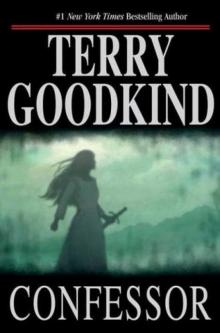 Confessor
Confessor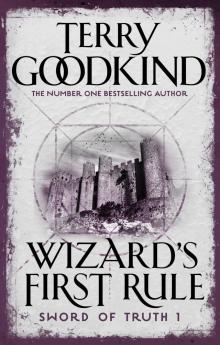 Wizard's First Rule
Wizard's First Rule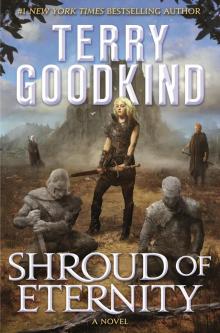 Shroud of Eternity
Shroud of Eternity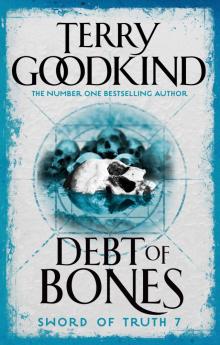 Debt of Bones
Debt of Bones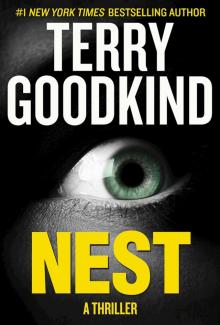 Nest
Nest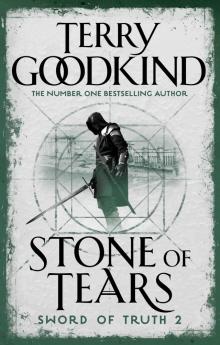 Stone of Tears
Stone of Tears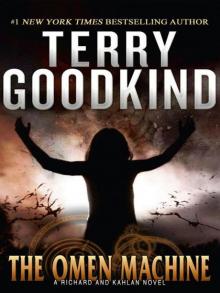 The Omen Machine
The Omen Machine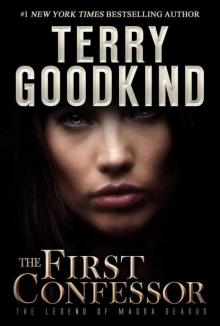 The First Confessor
The First Confessor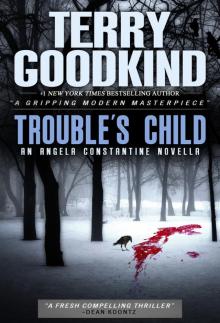 Trouble's Child
Trouble's Child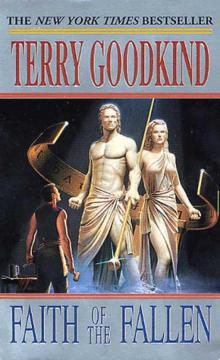 Faith of the Fallen
Faith of the Fallen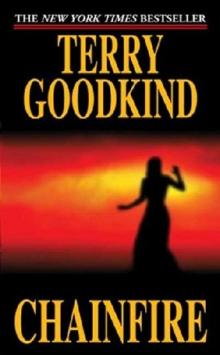 Chainfire
Chainfire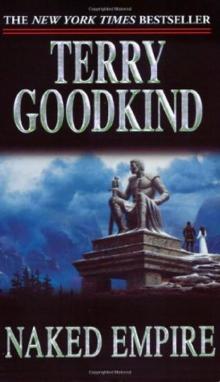 Naked Empire
Naked Empire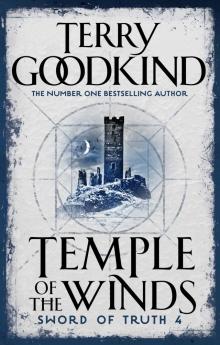 Temple of the Winds
Temple of the Winds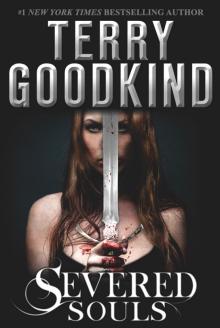 Severed Souls
Severed Souls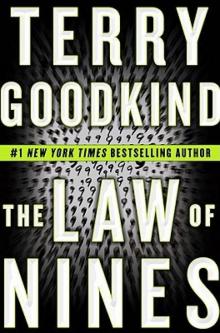 The Law of Nines
The Law of Nines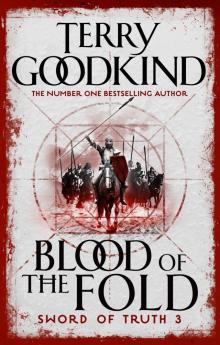 Blood of the Fold
Blood of the Fold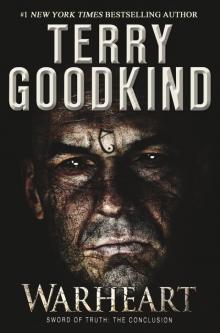 Warheart: Sword of Truth: The Conclusion
Warheart: Sword of Truth: The Conclusion The Sky People
The Sky People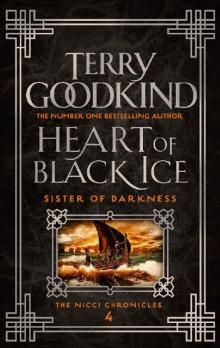 Heart of Black Ice (Sister of Darkness: The Nicci Chronicles Book 4)
Heart of Black Ice (Sister of Darkness: The Nicci Chronicles Book 4)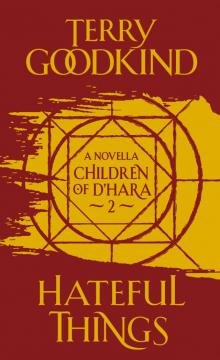 Hateful Things
Hateful Things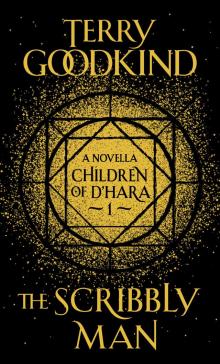 The Scribbly Man
The Scribbly Man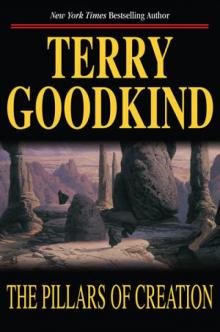 The Pillars of Creation
The Pillars of Creation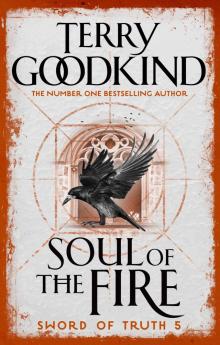 Soul of the Fire
Soul of the Fire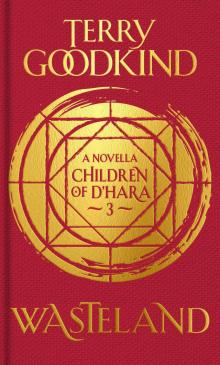 Wasteland
Wasteland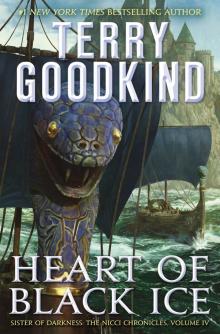 Heart of Black Ice
Heart of Black Ice Crazy Wanda
Crazy Wanda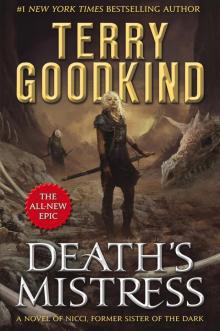 Death's Mistress
Death's Mistress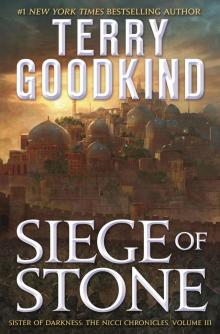 Siege of Stone
Siege of Stone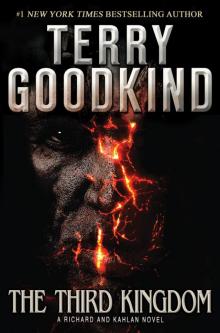 The Third Kingdom
The Third Kingdom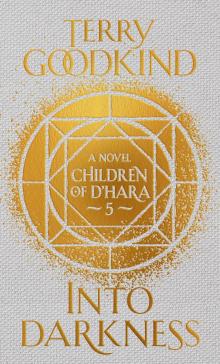 Into Darkness
Into Darkness The Girl in the Moon
The Girl in the Moon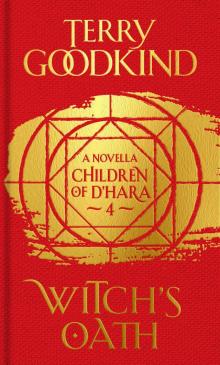 Witch's Oath
Witch's Oath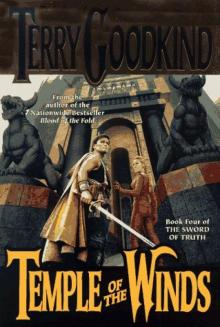 Temple of the Winds tsot-4
Temple of the Winds tsot-4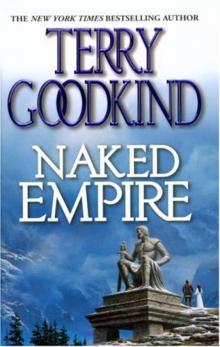 Naked Empire tsot-8
Naked Empire tsot-8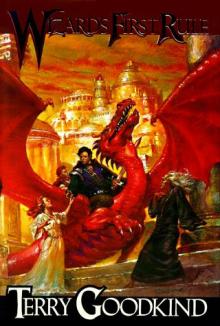 Wizard's First Rule tsot-1
Wizard's First Rule tsot-1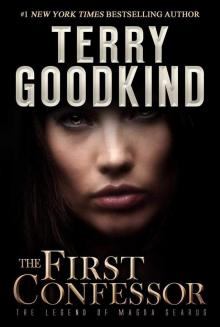 The First Confessor (The Legend of Magda Searus)
The First Confessor (The Legend of Magda Searus)![[Sword of Truth 9] - Chainfire Read online](http://i1.bookreadfree.com/i1/03/27/sword_of_truth_9_-_chainfire_preview.jpg) [Sword of Truth 9] - Chainfire
[Sword of Truth 9] - Chainfire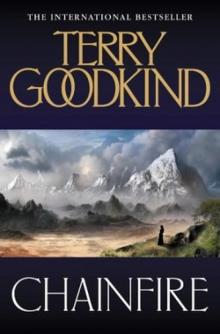 Chainfire: Chainfire Trilogy Part 1 tsot-9
Chainfire: Chainfire Trilogy Part 1 tsot-9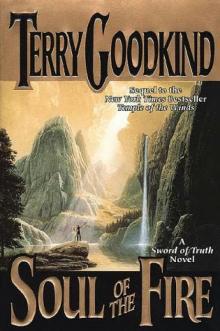 Soul of the Fire tsot-5
Soul of the Fire tsot-5 Pillars of Creation
Pillars of Creation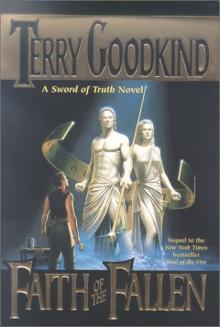 Faith of the Fallen tsot-6
Faith of the Fallen tsot-6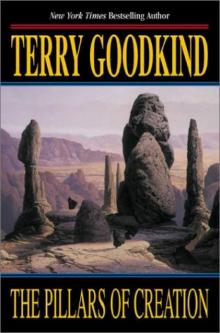 The Pillars of Creation tsot-7
The Pillars of Creation tsot-7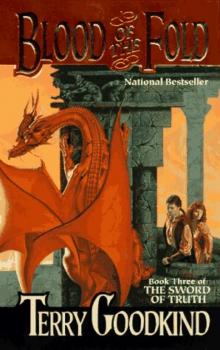 Blood of the Fold tsot-3
Blood of the Fold tsot-3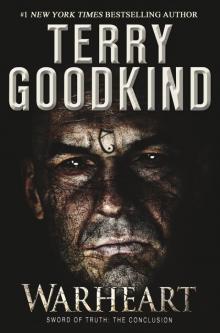 Warheart
Warheart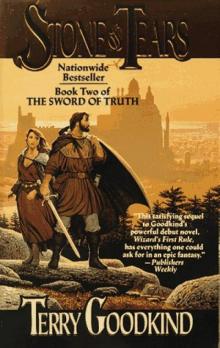 Stone of Tears tsot-2
Stone of Tears tsot-2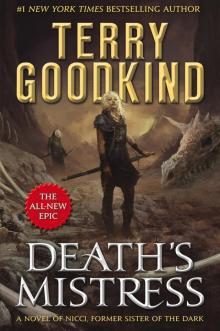 Death's Mistress--Sister of Darkness
Death's Mistress--Sister of Darkness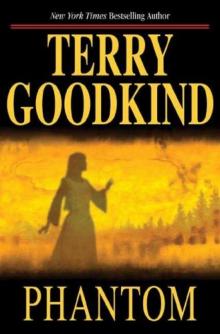 Phantom: Chainfire Trilogy Part 2 tsot-10
Phantom: Chainfire Trilogy Part 2 tsot-10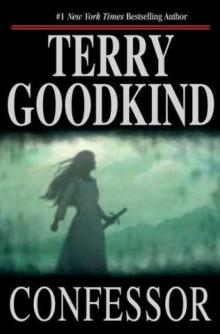 Confessor: Chainfire Trilogy Part 3 tsot-11
Confessor: Chainfire Trilogy Part 3 tsot-11